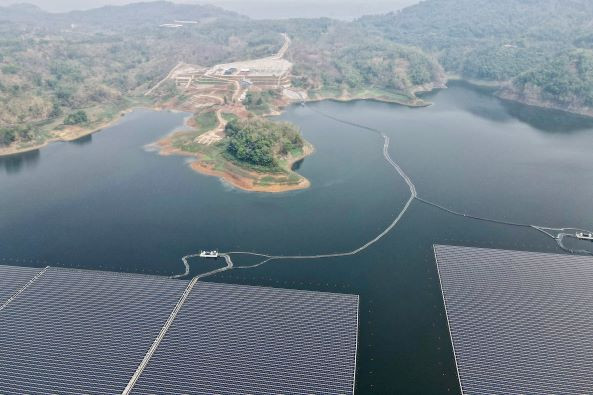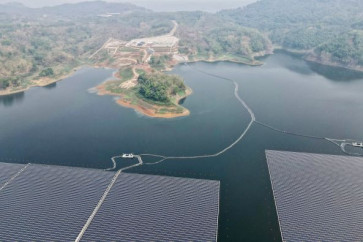Popular Reads
Top Results
Can't find what you're looking for?
View all search resultsPopular Reads
Top Results
Can't find what you're looking for?
View all search resultsThe ESG drive is virtually dead in the US. What about in Indonesia?
The US appears to have entirely dropped out of the race toward sustainability while Indonesia still has challenges, particularly as regards regulatory maintenance and strengthening to support ESG compliance in high-risk and land-related sectors, not least to attract serious investors to Danantara.
Change text size
Gift Premium Articles
to Anyone
 Hilly terrain forms a backdrop on Nov. 9, 2023, against the Cirata Floating Solar Power Plant, the largest facility of its kind in Southeast Asia that was jointly developed at Cirata Reservoir in Purwakarta, West Java, by the Indonesian government and Abu Dhabi-owned renewable company Masdar of the United Arab Emirates. (AFP/Bay Ismoyo)
Hilly terrain forms a backdrop on Nov. 9, 2023, against the Cirata Floating Solar Power Plant, the largest facility of its kind in Southeast Asia that was jointly developed at Cirata Reservoir in Purwakarta, West Java, by the Indonesian government and Abu Dhabi-owned renewable company Masdar of the United Arab Emirates. (AFP/Bay Ismoyo)
T
he United States is withdrawing from the Just Energy Transition Partnership (JETP), a collaboration between richer nations to help developing countries transition from fossil fuels like coal to renewable and cleaner energy. Indonesia, along with South Africa and Vietnam, are the impacted parties.
As the JETP program is inherently intertwined with the drive for promoting the environmental, social and governance (ESG) principles of sustainable development, this campaign is also virtually dead in the US.
Trump's policies have favored deregulation and traditional energy industries, undermining the progress made in ESG initiatives. During his first term, over 100 environmental regulations were rolled back and federal agencies issued guidance discouraging ESG-based decision-making in retirement plans. This approach reflects a broader criticism of ESG principles and practices as hindrances to economic growth.
Despite these challenges, ESG-focused funds have continued to thrive globally, driven by consumer and investor demand. Indeed, the rise of sustainable finance has attracted more investors who are often willing to pay extra for sustainability-related products. According to McKinsey's 2023 report, 40 percent of US investors were interested in buying sustainability-linked products.
In contrast, the European Union has been a global leader in sustainability efforts.
Despite strong opposition around the world, the bloc’s Regulation on Deforestation-free Products (EUDR), which aims to minimize deforestation and forest degradation associated with agricultural raw materials, has not been canceled; only delayed until December 2025 for large operators and traders.
The Carbon Border Adjustment Mechanism (CBAM) is another significant regulation in the EU's sustainability framework. It aims to put a fair price on the carbon emitted during the production of carbon-intensive goods entering the EU. However, the latest omnibus regulations at the end of February relaxed the mechanism to now apply only to a carbon threshold of above 50 tonnes.

















